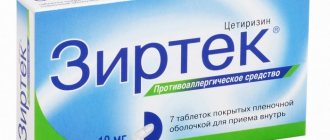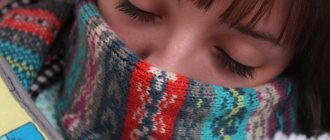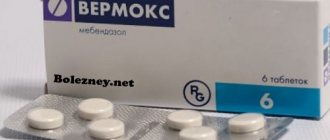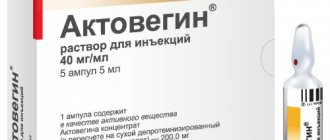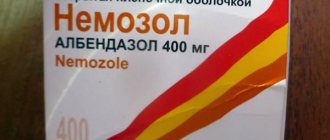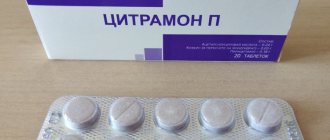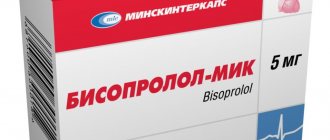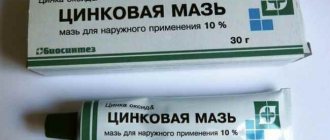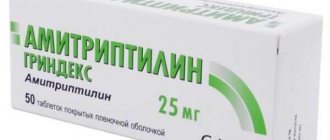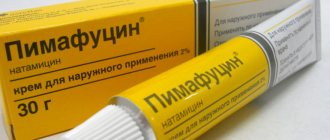Etiology and mechanism of disease development
The main reason for the development of an acute inflammatory process in the nasal cavity is a violation of general and local immunity, as a result of which viruses and bacteria easily attack, multiply on the mucous membranes and release their waste products.
Predisposing factors for rhinitis are:
- weakened immunity and frequent colds - in this case, the body’s ability to resist viral attacks is significantly reduced;
- the presence of chronic foci of infection in the nasopharynx - often an acute runny nose occurs in parallel with an exacerbation of chronic tonsillitis, sinusitis, sinusitis;
- long-term use of vasoconstrictor nasal drops - with uncontrolled use of drugs of this group, the nasal mucosa dries out, the vessels become brittle, and destructive tissue changes occur.
All these factors contribute to an imbalance of beneficial and pathogenic microflora of the nasal cavity, which creates the preconditions for the development of the inflammatory process. In addition, injuries and adverse effects on the nasal mucosa of various external factors can contribute to rhinitis:
- diagnostic interventions in the nasal cavity, as a result of which microscopic cracks are formed in the tissues, which represent the entrance gate for infection;
- nose scratches during hygiene procedures;
- blows and bruises, deviated nasal septum;
- formation of polyps in the nasal cavity;
- inhalation of dust, smoke, fumes of gasoline, acetone, paint and other things.
The inflammatory process of the nasal mucosa is characterized by the passage of certain stages, each of which has its own clinical signs.
What is rhinitis and the reasons for its occurrence?
Rhinitis is a common disease. Among the reasons that cause it, the main one is a violation of the immune defense, both general and local. It is accompanied by an increase in the number of pathogenic microorganisms in the nasopharynx. In people with reduced immunity, a runny nose occurs due to hypothermia, colds, and viral infections. It also appears as a result of trauma to the nose, the presence of foreign bodies in the nasal passages, and the development of pathological infections. Some suffer from acute allergic rhinitis, which is triggered by certain food, drug, or external allergens.
Scheme of acute rhinitis
Other causes of acute runny nose include:
- violation of the anatomy of the nose, for example, congenital defects or curvature of the septum, resulting in hypertrophy of the nasal concha;
- long-term influence of irritating factors - harmful fumes, dust, strong odors, which first irritate the nasal mucosa and then cause its chronic inflammation;
- influence of the external environment: hot or very dry air, which dries out the membrane of the nasal passages, and sudden hypothermia reflexively changes vascular tone, and discharge appears;
- chronic pathological processes in the pharynx and sinuses with sinusitis or sinusitis, chronic tonsillitis or adenoids;
- taking certain medications, especially vasoconstrictor medications, which, when used for long periods of time for more than 7 days, cause vasomotor rhinitis.
Acute and chronic rhinitis do not go away without special treatment, which must be prescribed by a doctor, otherwise, as a result of self-medication, a much more unpleasant disease may develop, for example, sinusitis, which is often treated with very painful punctures.
Violation of nasal anatomy is one of the causes of acute rhinitis
Stages of development and associated symptoms
According to the International Statistical Classification, acute rhinitis has ICD 10 J00 code and is characterized by a sudden progressive onset and simultaneous involvement of both sides of the nasal cavity. The main clinical signs of the disease are: respiratory failure, swelling, profuse nasal discharge, deterioration in general health.
The disease has several stages:
- irritation stage (also called dry);
- stage of serous discharge;
- stage of mucopurulent discharge.
Stage of serous discharge
Symptoms of acute rhinitis at this stage are characterized by a rapid increase in signs of the inflammatory process, so copious serous (mucous, watery, transparent) discharge from the nasal cavity is added to the above symptoms.
Discharge is an effusion from inflamed vessels of the mucous membrane. At the same time, the function of the glands and goblet cells of the epithelium is enhanced, which leads to even greater secretion of mucus.
The effusion contains a large amount of salts and ammonia, which irritate the tissues of the nose, which is characterized by the following symptoms:
- swelling of the nasal cavity;
- redness of the tissue under the nose;
- severe burning sensation;
- nasal congestion and impaired breathing.
The duration of rhinitis at the stage of serous discharge is about 2-3 days.
Stage of mucopurulent discharge
It occurs approximately 4 days from the onset of the inflammatory process in the nasal cavity and is characterized by a change in the composition of the secretions; they become thick, yellow or greenish - this is the presence of lymphocytes, epithelial cells and neutrophils in the transudate (effusion).
At this stage, swelling of the tissues of the nasal cavity decreases slightly, nasal breathing improves, and the amount of mucus discharge decreases. After about 7-8 days, the symptoms of rhinitis disappear and recovery occurs, provided that the patient’s body and his immune system are working correctly and were able to cope with the infection.
In persons with weakened immunity and the presence of concomitant chronic diseases of the nasopharynx, the disease may be complicated by the addition of a secondary bacterial infection, the spread of pathogenic flora to the lower parts of the respiratory system, and the transition of rhinitis to a chronic form.
Causes
The most common causes of nasal rhinitis of infectious origin are:
- viruses;
- pathogenic microflora;
- decreased immunity;
- hypothermia and overheating of the body;
- too cold or hot air, high humidity.
Inflammation of the nose of non-infectious origin is caused by:
- allergy;
- contact with harmful substances;
- polluted air, hazardous working conditions;
- VSD;
- vascular pathologies and circulatory disorders;
- diseases of the endocrine system;
- neoplasms in the nose;
- diseases of the bronchi and lungs;
- burns, mechanical injuries;
- influence of medications;
- diseases of the oropharynx.
Acute rhinitis due to influenza
Rhinitis due to influenza or adenovirus infection is secondary or specific, since inflammation of the nasal mucosa is not an independent disease, but is caused by the main infectious process.
Clinically, rhinitis manifests itself in the same way - nasal congestion, copious mucous and mucopurulent discharge, swelling, but there are also general symptoms of the disease:
- high body temperature (up to 38.5-39.0 degrees);
- muscle aches;
- lacrimation and inflammation of the conjunctiva;
- photophobia;
- headache;
- stuffy ears and often the development of otitis media;
- general weakness and increasing intoxication of the body (abdominal pain, lack of appetite, nausea, diarrhea).
The duration of rhinitis due to influenza largely depends on the adequacy of therapy and the timeliness of seeking medical help. In the absence of complications, all signs of disease and inflammation of the nasal cavity disappear after 10-14 days.
Analogues of Rhinitis tablets
Often, the use of Rhinitis causes the development of side effects: headache and dizziness;
- nausea and vomiting;
- arrhythmia;
- diarrhea or constipation;
- rashes on the skin;
- baldness;
- liver failure.
A large list of contraindications and side effects makes you wonder - what can replace Rhinitis tablets?
According to competent experts, there is no scientifically based evidence that any of the H2-histamine blocker medications is better than others.
Remedies that are similar in effect to Rhinitis:
- Ranitidine;
- Cimetidine;
- Nizatidine;
- Famotidine.
It is generally accepted that Famotidine has a longer action. There is also evidence that it causes fewer side effects. But the cheapest is Ranitidine.
When using Cimitidine, you need to know that there is evidence that it can cause the development of erectile dysfunction in men.
Features of the course of acute rhinitis in children
Acute rhinitis in young children is much more severe than in adults, and the younger the patient is, the more pronounced the manifestations of the disease will be. In infants (up to 1 year), inflammation of the nasal mucosa is accompanied by the following symptoms:
- refusal of breast milk - the child greedily grabs the mother’s breast and almost immediately throws it away due to the inability to breathe through the nose while sucking;
- restlessness and constant crying;
- snoring during sleep;
- paroxysmal cough, worsening when lying down - it is often caused by pathological discharge flowing down the back wall of the child’s nasopharynx, which causes tissue irritation and a defensive reaction in the form of coughing;
- increase in body temperature - can reach high levels.
Often children's rhinitis is complicated by adenoiditis, pharyngitis, laryngotracheitis, and inflammation of the middle ear. This is due to the anatomical features of the structure of the nasopharynx and middle ear - in children the auditory tube is thick and short, located almost horizontally, as a result of which infection from the nose easily spreads to these cavities.
In addition, young children do not yet know how to blow their nose or do it incorrectly, during which pathological mucus enters the middle ear cavity. The mucus puts pressure on the eardrum, bacteria actively multiply in it, and otitis media develops. How to effectively clear snot from your nose - read here.
Acute rhinitis during pregnancy
When carrying a child, a woman's immune defense is significantly weakened, since the body does double work - this makes the expectant mother vulnerable to attack by viruses and bacteria.
Runny nose and colds are frequent companions of pregnancy, and the main thing is not to self-medicate in this case, so that the infection does not spread to the lower respiratory tract. A pregnant woman should treat colds and rhinitis of any severity together with a therapist so as not to jeopardize the health of the unborn baby.
Acute runny nose and nasal congestion in pregnant women may not always be caused by a viral infection. There is such a thing as vasomotor acute rhinitis - inflammation and swelling of the nasal tissues, provoked by hormonal changes. In this case, the use of any antiviral drugs is impractical and ineffective, so the expectant mother can only wait patiently for the birth.
If nasal congestion is so severe that a woman cannot breathe, sleep, or eat, then with the doctor’s permission, vasoconstrictor drops can be instilled into the nose before bed, preferably in a pediatric dosage.
You should not overuse nasal drops, since long-term and uncontrolled use of drugs with a vasoconstrictor effect may narrow the small vessels of the placenta, as a result of which the fetus will suffer from hypoxia. Read about how to treat nasal congestion during pregnancy in this article.
Prevention measures
If we take a closer look at the available measures to prevent rhinitis, there are also several groups of actions: some are related to nutrition, others are related to medicinal preventive measures, others are related to hygiene, etc. To avoid the development of rhinitis and nasopharyngitis in children and adults, you need to monitor your immunity - it is this that will help the body cope with the effects of infections. To do this, you need to eat right, strengthen your body, regularly walk in the fresh air and avoid hypothermia.
It is worth remembering that the prevention of any disease, including in children, is not a one-time event. To avoid getting sick, it is important to regularly take all precautions.
Let's take a closer look at the existing measures to prevent rhinitis:
- Treat or prevent colds in a timely manner. While adults themselves can feel that they are getting sick, this is not typical for children. Parents should be wary of any changes in their children's condition and consult a doctor promptly.
- You should not be in a draft, suddenly move from warm to cold, or drink ice water or other cold drinks. In order for the body to tolerate the cold more easily, it is necessary to balance the temperature in the house and outside the window, if possible, by regularly ventilating the room. It is better to sleep with the window open, since many bacteria and viruses die in the fresh air. You can also use essential oils to purify indoor air: when they evaporate, they kill microorganisms.
- Try to toughen up and play sports. This is especially true for children whose immunity is still developing. You can douse yourself with cold water, take a contrast shower, as well as air and sun baths, wipe yourself with snow, etc. It is only important that hardening begins gradually so that the body has time to react correctly to changes.
- Adhere to the principles of proper nutrition. Firstly, a clear diet must be drawn up, which you must try to follow at all times - even on holidays and weekends. Secondly, food must be rich in vitamins and minerals necessary to maintain health. During epidemics, you should lean on foods high in vitamin C (citrus fruits, cabbage, onions, currants, etc.). If there are not enough vitamins in foods, you can think about taking one of the vitamin-mineral complexes, but consult your doctor before doing so.
- Hygiene must be maintained, from regularly damp cleaning the room to washing hands before eating and after visiting public places. Everyone, including children, should have their own hygiene products (washcloth, towel, toothbrush, soap, etc.). You should also try to prevent contact with sick people and always use a clean handkerchief. To protect yourself from infection in crowded places, you can wear a protective mask.
- Periodically you need to rinse your nose with one of the solutions. This flushes out pathogenic bacteria from the mucous membrane. Such drugs that do not harm the body in any way and can be used even in children are Aquamaris, Morenazal, Physiomer, Marimer, Salin, etc.
Prevention of allergic rhinitis is especially considered, since the most important thing here is to protect yourself from the action of the allergen and, of course, to identify it. This type of rhinitis is observed quite often in children. If the allergy occurs in response to animal fur, then you need to get an animal without hair. If the cause is plant pollen, you should try to avoid the places where a particular plant grows. This is what you need to do with any allergen - rid your body of its effects.
In any case, preventive measures are useful. It is better to spend a few minutes following these simple recommendations than to then spend much more time treating emerging rhinitis and eliminating its possible consequences.
The heroes of the TV show “Natural treatment and prevention of colds and runny nose in children” talk about a natural way to prevent and treat runny nose and sore throat.
General principles of treatment
Acute rhinitis can be treated on an outpatient basis, after the patient has been examined by a doctor and the cause of the inflammatory process has been established. Depending on the nature of the origin of the inflammation and the severity of the clinical symptoms of the disease, the patient is prescribed:
- solutions for rinsing the nasal cavity;
- vasoconstrictor drops to ease breathing and relieve swelling;
- antiviral drugs – if rhinitis is caused by a viral infection;
- immunostimulants and vitamins;
- physiotherapeutic treatment;
- traditional medicine.
Treatment of rhinitis at the irritation stage
Since this stage of the disease is accompanied by dryness and burning in the nose, an important condition is maximum tissue hydration. To do this, use various saline solutions based on sodium chloride or sea salt:
- Humer;
- Aquamaris;
- Aqualor;
- No-salt;
- Chistonos;
To increase local immunity and fight infection, recombinant human interferon is prescribed intranasally (lyophysiate is diluted with boiled water according to the instructions and instilled into the nose every hour).
Treatment at the stage of serous discharge
To the salt preparations listed above, vasoconstrictor drops are added, which help to quickly relieve swelling of the mucous membrane and restore nasal breathing:
- Otrivin;
- Farmazolin;
- Galazolin;
- Rinazoline;
- Nazivin.
At normal body temperature, physiotherapeutic procedures can be carried out - quartz tube into the nasal cavity, inhalation with antiseptic solutions through a nebulizer, mustard plasters as distracting procedures.
Treatment of rhinitis at the stage of mucopurulent discharge
To the above listed procedures and drugs add antiseptic solutions with antimicrobial and astringent effects - Protargol, Collargol, drops based on essential oils (Pinosol).
If a secondary bacterial infection occurs or the inflammatory process spreads to the maxillary sinuses or lower respiratory tract, general and local antibiotics - Isofra, Polydexa, Amoxicillin and others - will help cure a runny nose. Bioparox and Hexoral are used to irrigate the larynx.
Specific names are selected based on the results of a bacteriological study of nasal discharge. If local antibiotics (in the form of drops and nasal sprays) are ineffective, a tablet form of medication is used. – More details here.
Never inject antibiotic solutions or various “complex” homemade drops into the nasal cavity, especially when it comes to treating children - such actions can lead to a severe allergic reaction and anaphylactic shock.
Therapeutic measures
Acute rhinitis requires treatment on an outpatient basis. Bed rest is recommended for patients with high fever and severe general weakness. When establishing the viral nature of the disease, it is necessary to limit contact with the patient.
Treatment, started on time and carried out in accordance with the doctor’s instructions, will overcome acute rhinitis on the second day.
The need for treatment at an early stage of the disease is important because effective drugs used at this stage are available and have no side effects.
When the first signs of dryness and itching in the nasal passages appear, the following procedures are necessary:
- hot, warming bath - general or for feet for 15 minutes;
- using mustard plasters on the calf muscles or on the foot;
- hot tea with raspberries, honey;
- 0.1 grams of Paracetamol;
- lie in bed and sweat.
The measures taken on the first day of illness contribute to recovery, without having time to reach all stages of the disease.
Since it is necessary to treat acute rhinitis according to the stage of the disease, therapy is prescribed accordingly:
at the first stage, local medications are recommended: Lysozyme, Interferon. For headaches, Ganaton and Solpadeine are used. Antihistamines are prescribed: Tavegil, Loratadine and a vitamin complex. They have a positive result on the course of rhinitis in the first stage, but their effect extends to the second stage;- if the second stage is characterized by pronounced inflammatory processes, then a combination of antibiotics and antiseptics is recommended: Hexoral, Bioparox. To facilitate nasal breathing, vasoconstrictors are used: Otrivin, Sanorin. Physiotherapy will have a positive result: UHF in the nose area, UV irradiation in the nasal cavity;
- in the third stage, medications with astringent and antimicrobial properties should be used: 5% solution of Protargol. Continue physical therapy and take vitamins. The use of nasal drops and inhalations is limited to 7-10 days. Long-term use of nasal medications contributes to the occurrence of pathological processes and disruption of the vasomotor function of the mucous membrane.
Folk recipes
An excellent addition to treatment with medications are traditional methods:
Treatment with kerosene. They lubricate the soles of the feet with it and put on woolen socks. The session is done at night. One procedure will require 20 grams of product;- Laundry soap. To eliminate nasal congestion and regular discharge from the nasal sinuses, you will need laundry soap. They need to soap their finger and lubricate the inside of the nasal openings. These sessions must be performed up to three times a day;
- Calendula infusion. The medicinal herb has an antibacterial effect and reduces inflammation. You will need a dessert spoon of raw materials and a glass of boiling water. Pour water over the herb and leave in a thermos for one hour. The finished product is used to rinse the nasal cavity for 3-5 days;
- Carrot drops. To prepare them you will need carrot juice and vegetable oil in a 2:1 ratio. Use only freshly prepared juice. Inject two drops into each nostril four times a day;
- Menthol oil. It has an excellent disinfecting effect and reduces inflammation of the mucous membrane. Eliminates nasal congestion and headaches. Drop two drops into the nostril twice a day.
Before using these recipes, you should consult a doctor to ensure there is no individual intolerance.
Alternative medicine
Treatment of acute rhinitis in adults and children can be carried out using folk recipes, but they should not replace medications prescribed by a doctor, so as not to expose yourself to the risk of developing complications.
At the stage of dry irritation, drinking plenty of warm water helps a lot - teas with raspberries, lemon, dried fruit compotes, decoction of rose hips, linden, chamomile. To prevent the spread of the pathological process from the nasal cavity to the pharynx and lower respiratory tract, you can gargle with soda or soda-salt solution.
Infants should be put to the mother's breast more often, and children older than six months should be additionally offered compote, tea, and water. Some mothers use their milk as nasal drops - this does not make sense, since breast milk does not contain any antibacterial or antiviral components, and is an excellent breeding ground for bacteria.
To reduce burning in the nose and tissue irritation due to heavy discharge, you can lubricate the skin around the nose with peach oil or sea buckthorn oil.
The natural antimicrobial properties of garlic and onions are known to many, and for rhinitis, these products can also help you recover faster. For runny nose and cold symptoms, finely chop the onion and garlic and place it in saucers in all rooms. Evaporated phytoncides will destroy viruses and bacteria in the air, and will also prevent infection of other family members.
There are known cases of instilling onion juice into the nose for a runny nose, but it is better not to use this method, especially in children, since the “drops” cause severe burning and lacrimation when they come into contact with the inflamed mucous membrane. For a complete guide to folk remedies for the common cold, read here.
Potapova Natalya Yakovlevna - Acute runny nose
If rhinitis is caused by allergies
Antiviral drugs will not be effective if the cause of the disease is an allergic reaction. Therefore, it is necessary to know what medications are used for allergic rhinitis.
- Severe allergic rhinitis is treated with antihistamines. These include drugs such as Zyrtec, Claridol, Cetrin, Claritin, Clarotadine, Letizen, Analergin and many others. It is important to consult with your doctor before using them and find out exactly the cause of your symptoms.
- For mild allergic rhinitis, it is recommended to use Zodak and Cetrin, which have a gentle effect on the body without causing serious side effects. Such drugs do not have a depressing effect on the psyche, do not cause drowsiness or lethargy, and have a minimum of contraindications. They are taken one tablet once a day; they are also often used as a quick aid when allergies occur.
- If the patient has the most severe form of rhinitis, the doctor prescribes Diazolin tablets three times a day. It is important to understand that this medicine should not be taken as an emergency measure. The drug depresses the central nervous system and is able to penetrate the placenta. Of all the forms of this medicine, tablets have the gentlest effect on the body.
The most powerful medicine for rhinitis and allergic rhinitis is the drug Erius, which is prescribed to be taken if the patient has a serious condition.
